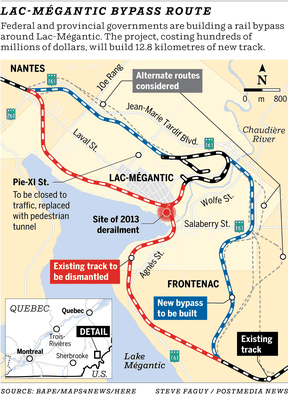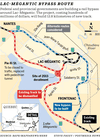Article content
QUEBEC — The federal government has no intention of giving in to a new voice opposing the Lac-Mégantic rail bypass.
One of the three municipalities concerned, Nantes passed a resolution saying it is withdrawing from the controversial bypass project and that it will no longer collaborate with Transport Canada, which is leading the project.
A good part of the 12.5 km route of the ring road is located in the territory of Nantes.
Article content
This project was developed following the 2013 rail disaster, which devastated downtown Lac-Mégantic and left 47 dead.
It aimed to ensure that such a tragedy never occurs again and that the population no longer experiences the trauma of the convoys that still circulate daily, but it has still not obtained all the required authorizations from the Canadian Transportation Agency.
“Our government will remove the railway from downtown Lac-Mégantic,” assured federal Transport Minister Anita Anand in a written statement sent to The Canadian Press on Wednesday.
“We have been consulting everyone for years, including the municipality of Nantes, so that the project responds to local concerns,” she said.
“We are always ready to discuss this further with Nantes to find solutions that bring them benefits.”
In a long resolution adopted unanimously Tuesday evening, the Nantes municipal council accuses the federal government of having turned a deaf ear to its requests for compensation and of not having planned specific aid programs for the affected municipalities.
Nantes also criticizes Ottawa for having refused 12 proposals for economic, social and leisure projects.
Article content
Finally, the city’s elected officials said the project no longer enjoys social acceptability in the area.
The federal government, for its part, responds that 47 mitigation measures were implemented to respond to the community’s concerns.
More than 11 years after the disaster, the bypass project is facing more resistance than ever.
It was officially announced in May 2018, with a joint Ottawa-Quebec funding agreement, at 60 and 40 per cent respectively.

Since then the neighbouring municipalities of Nantes and Frontenac have expressed their opposition, as well as farmers and citizens, who are demanding new consultations from Quebec’s Bureau d’audiences publiques sur l’environnement (BAPE).
BAPE hearings have already taken place in 2017 and 2019, but opponents claim that this was before all the implications of the route were known.
The project requires digging a major trench that will affect the water table.
The MRC du Granit’s regional wetlands and water program lists 110 hectares of wetlands that would be destroyed, out of the 138 hectares required for the planned route, Frontenac Mayor Gaby Gendron said in an interview.
The new route reduces the number of residences located near the railway line, from 258 to 18 on a 100 metre right-of-way.
In the 2022 budget, Ottawa released $237.2 million over five years for the construction of the project and the dismantling of the current track.
On July 6, 2013, a 72-car crude oil train from Montreal Maine and Atlantic was parked in Nantes, without a driver. The locomotive caught fire and suffered brake failure. The train began to descend the slope, the second longest in Canada, towards Lac-Mégantic.
More than 6 million litres of oil were spilled. In addition to the 47 deaths, 44 homes and businesses were destroyed, 2,000 people were forced from their homes.
Recommended from Editorial
Share this article in your social network



